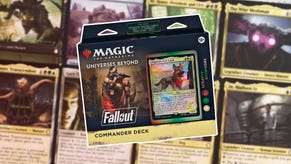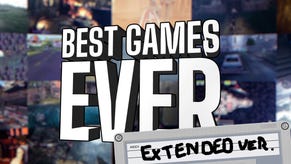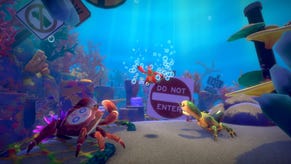The Story of Playism, Part 2: The Tricky Task of Bringing Japanese Indies to the West
COVER STORY: The challenges and rewards of seeking out the hidden gems of Japanese gaming.
This article first appeared on USgamer, a partner publication of VG247. Some content, such as this article, has been migrated to VG247 for posterity after USgamer's closure - but it has not been edited or further vetted by the VG247 team.

From across the world
When Stern isn't at Comiket, he's working with the rest of the team at Active Gaming Media's office, which is housed in one of Osaka's many skyscrapers. The cramped open-plan office is divided into two parts, with Playism occupying a small island of desks on one side. The rest of the space is filled with administrators, designers, and engineers attending to AGM's various projects.
Like the rest of AGM, Playism mixes native Japanese with transplants from countries ranging from Spain to the UK. The diversity within AGM brings with it a unique atmosphere and exchange of ideas as team members interact in Japanese and English.
Meghan Bridges is typical of Playism's staff. Bridges grew up in South Africa and studied Japanese in England before moving to Japan, where she began as a teacher. She eventually joined Playism as an intern, and in her words, somehow just never left. Now she's in charge of community management, marketing, and social media, interacting with Playism's community through Steam's forums and other sources. She works closely with Shuto Sunagawa, who handles many of the same responsibilities from the Japanese side
"He takes care of the Steam stuff. But because Steam is predominantly foreign, not Japanese, when I spot the Japanese people I'll immediately guide him towards them so they're not lost in a sea of English," she says.
As with everyone else, Playism's small team neccessitates her wearing a variety of hats. So while she Tweets and communicates with the community, she also has to work with Stern to plan events, and with Mizutani on the marketing plan for new games. From the outside looking in, it's an almost overwhelming amount of work, but she seems to take it in stride. "I'm the go-between. Semi-jack of all trades, solving the community's problems," she says.
It helps that the community is comparatively easy to deal with, Bridges says. Like every community, Playism has its share of core users, and they can occasionally get vocal. But her main observation is that the users just like to feel like they're being heard. "I enjoy the community. Everybody that I've spoken to that's also done community support, they'll always be really positive about it. Everyone's always got a story of, 'Oh, this negative thing happened, but in the end of the day, they're just trying to play their game.' It might not work the first time, but I'll find the problem. We'll fix it. There's no point in being negative about it, because it isn't a negative thing."
The fact that the Playism team is fairly close-knit also helps take some of thee pressure off, Bridges says. "I really enjoy the Playism team. It's a great place to work, because we all work together. If one of us doesn't understand something, we'll coordinate with the others, and they'll help. You'll get there. I think we work well together, and I honestly think that's one of the aspects where Playism is pretty strong, our internal bond with each other is actually pretty strong. Some of us are even friends outside of the company, which really helps. My last job, it's like, we work well with everyone, and we're friends, but outside of work you didn't talk."
The small size of the team—currently about 10 developers—helps foster a certain sense of comraderie, as does the constant stream of work. In addition to straight localization, which is time-consuming and expensive on its own, the team has to navigate issues like making sure that their game works with every type of console firmware. Debugging is incredibly time-consuming, particularly for such a small team. And as they get closer to the release date, they have to start worrying about marketing and community management, which includes such mundane concerns as which banners to post to Steam.
As with any development process, Playism will run into their share of obstacles. When I was visiting back in July, Playism was grappling with a challenge unique to localizing small indie games. "It might be my favorite game," says Hugo Clarke, who heads up localization for Playim. "But the reason that one is taking so long is because, it was made in a very old version of RPG Maker, and the text is actually inside images."
Needless to say, it's been incredibly slow going.
Even when a project is relatively straightforward, it can be a lot of work. La-Mulana's localization required a special attention to detail lest a puzzle become basically impossible to solve. One Way Heroics required one localizer to translate roughly 120,000 characters, which meant long nights and weekends spent getting it up to speed. The project was finished in just three months.
But the crunch isn't always that bad, says Clarke. "In Playism, our clients are basically the developer. Of course we want to get the games out quickly, but, it's a little bit more relaxed than when you're working with clients from some big company. One of the reasons is that these things naturally take a lot of time because the developer is working on their game at the same time. They've got their own schedules to worry about, so they can't get back to us quickly. Of course, some of them can, which is great, and we always love that. But yeah, these things take time."
Ultimately, Playism is involved at pretty much every level of the development process. They will even go so far as to play game builds in development and offer constructive feedback. The work involved requires a degree of discipline and teamwork that is impressive for such a small team, especially one with a natural language barrier.
And though strenuous, such work has its rewards. There's the fun of going to events like BitSummit, meeting fans, and perhaps most importantly, helping previously unknown developers succeed. Beyond that, there's the simple pleasure of working with people you respect in a medium you love.
"I think one of the first big memories was when we bought out D4. A lot of my thoughts of Playism at that time is working together on D4 and dealing with the community that D4 had before it came to PC, and the SWERY community as a whole coming this way," Bridges says. "And suddenly Playism was fitted with this, and there were people who were like, 'Oh, wow, Playism is great,' and then there are a couple other people who were like, 'Who's Playism?' And that was a real defining moment, because we took D4 to BitSummit."
"We're pretty much the best of friends, and there's not really any cultural boundaries," Clarke says. "There's maybe different approaches sometimes, I guess, but we all want to do the same thing. And I think, in general, indie games bring people together. Like, BitSummit, it was amazing to see all these people sharing the same passion. And, thanks to gaming platforms, people are now using the same interfaces online to play their games and stuff, so, it's becoming kind of a common language, isn't it?"
But for all of Playism's success as a niche publisher, they still face the challenge of being a small outfit in a ferociously competitive market. And that means that sometimes hard choices have to be made.








